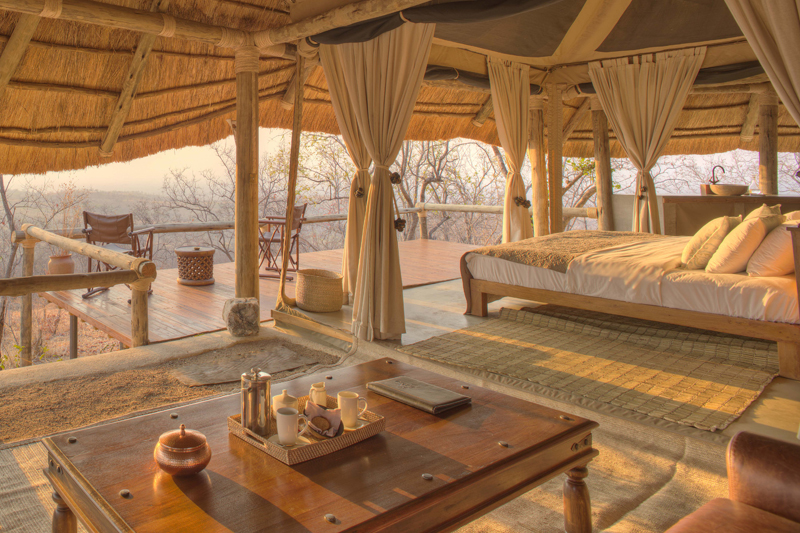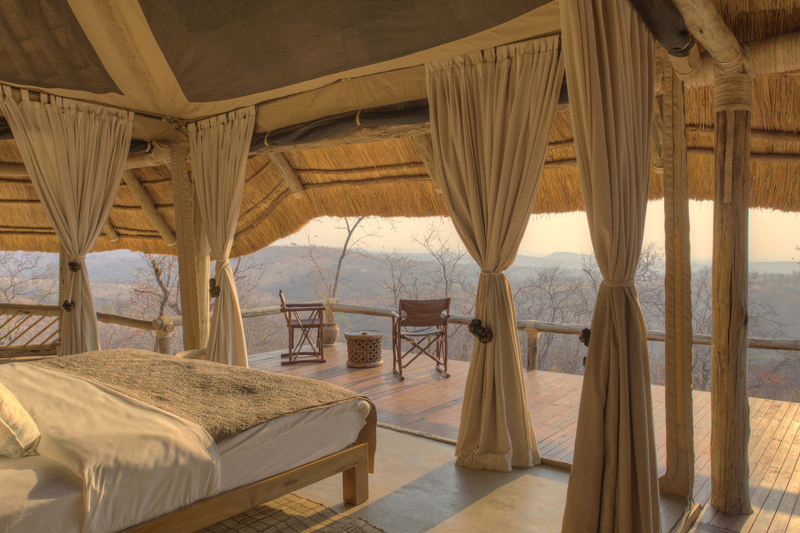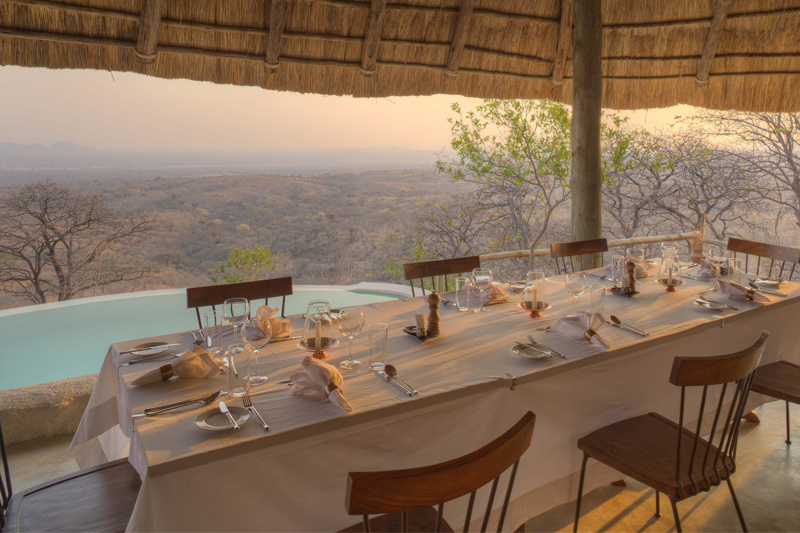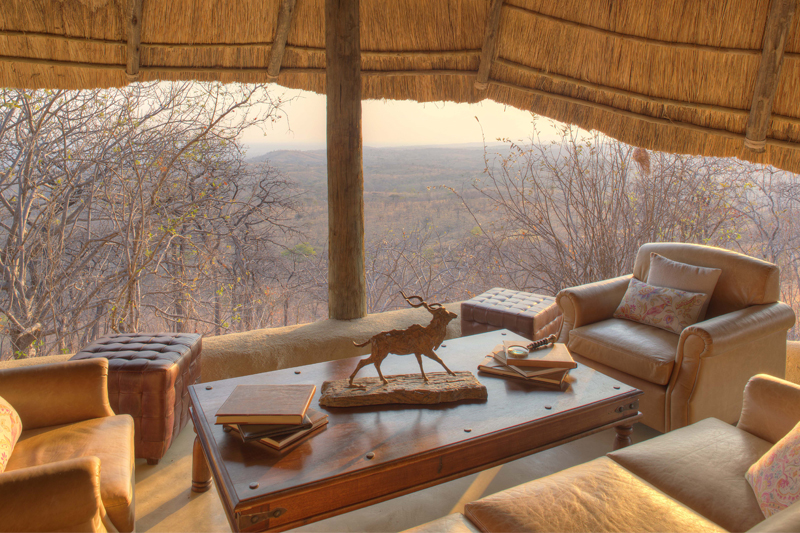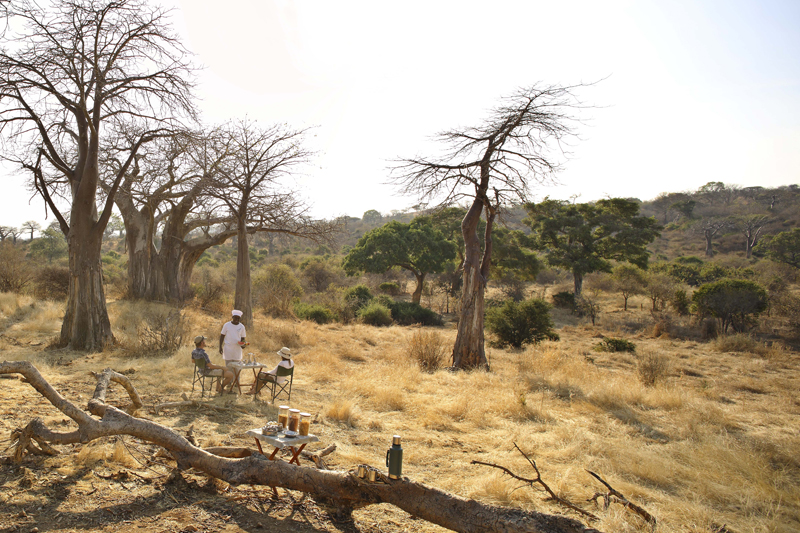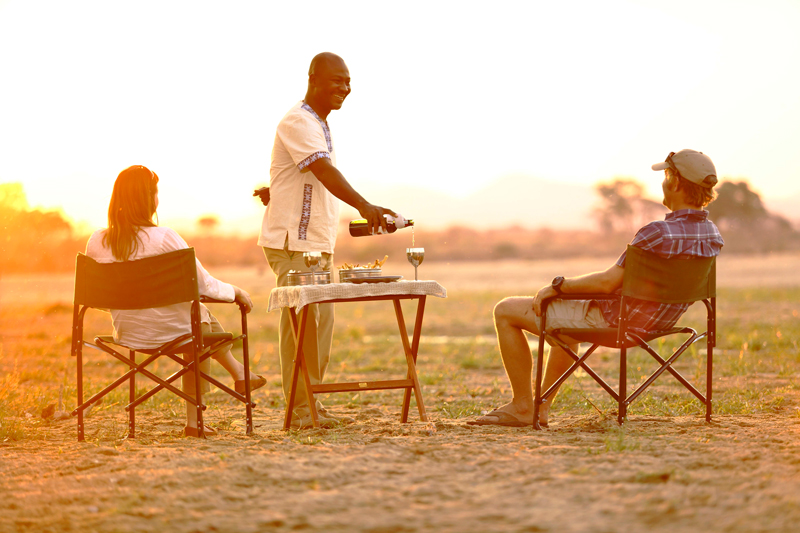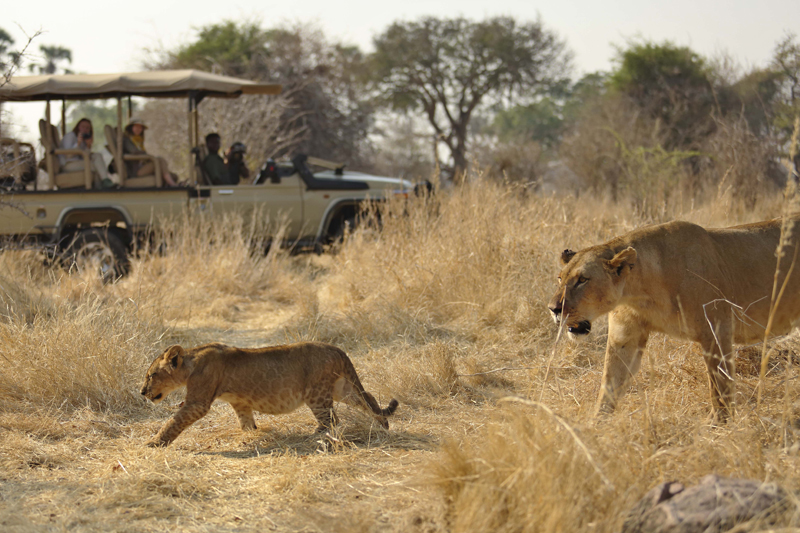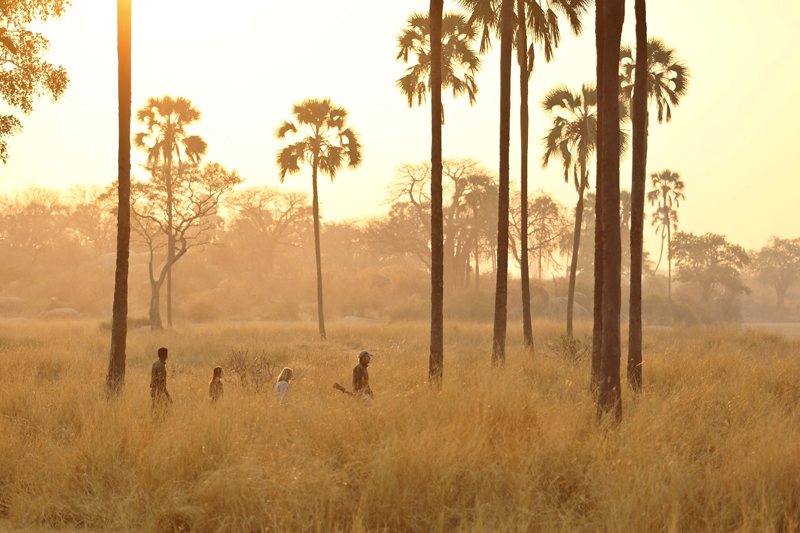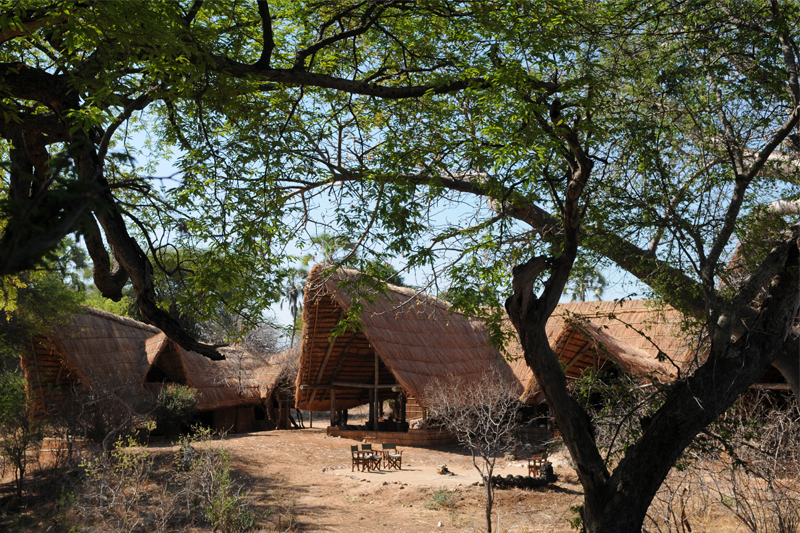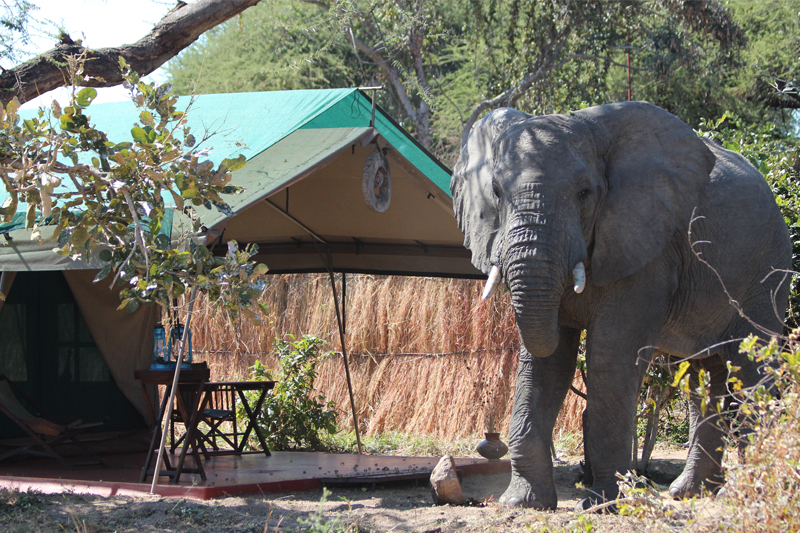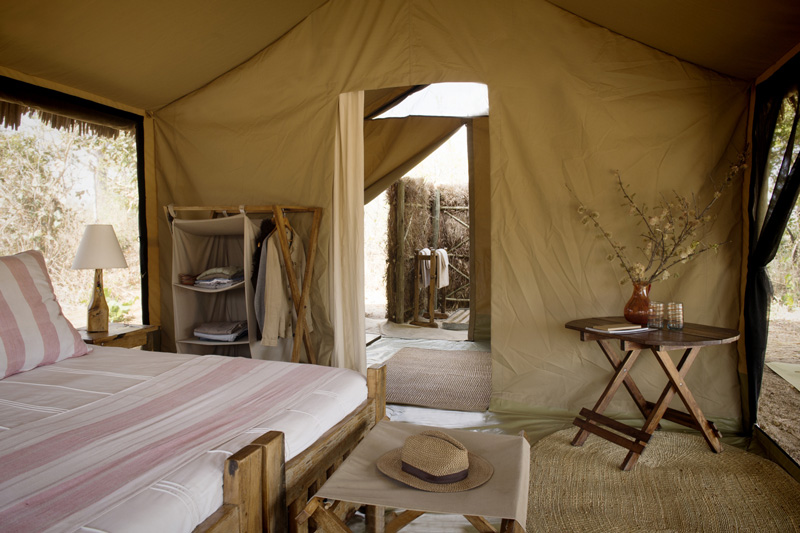Ikuka Safari Camp
Ikuka Safari Camp is a tented lodge set on the top of a ridge overlooking the Mwagusi River Valley in the northern part of Ruaha National Park.
Ikuka Safari Camp is an owner run property which offers a sophisticated and relaxing lodge experience without losing any connection with the surrounding bush environment. The elevated location, wonderful views and swimming pool naturally encourage visitors to relax during the heat of the day, whilst the core game viewing areas around the Mwagusi River are just a 25 minute drive away. In general Ikuka is slightly less adventurous than some other tented camps in the park, offering more substantial accommodation and central areas, but with friendly personal service and excellent guiding, Ikuka is still very suitable for travellers looking for a genuine wilderness experience and who enjoy a warm and relaxed lodge atmosphere.
Rooms
Accommodation at Ikuka is in seven open-sided tented suites dotted along the escarpment, each affording fantastic views over the park. The rooms have been beautifully designed using neutral colours and comprise canvas, white quartz (from the escarpment itself) and other locally sourced materials giving them a sophisticated but relaxed feel. Each suite is built under a large thatch roof and include a spacious central tented bedroom area, built slightly off the ground with solid floor. The bedroom area has roll-up canvas and gauze sides and linen curtains which can remain open during the day, allowing for a breeze and to enjoy the views, and closed at night. The king/twin beds have a large headboard with rustic wooden lamps and wardrobe/dressing area behind, and there are ceiling fans. To the fore of the suite is a large deck with comfortable safari chairs to enjoy the view (four of the suites have private plunge pools). To one side of the bedroom, under the thatch, is a comfy seating area with leather sofas and a coffee table. To the other side of the bedroom is the large open plan bathroom with stone walls at the back allowing privacy and a low wall to the front to incorporate the view. The facilities include a wonderful rain shower, toilet and double vanity. One of the units is a family room which has an additional mezzanine bedroom (with twin beds) above the main sleeping area (accessed by stairs from the sitting area), and this is one of the suites that has a plunge pool on the deck. The bathroom is shared (and includes a bath).
Central Areas
The central areas of the camp are also covered by a large thatch roof with a smooth concrete floor and include an airy well-stocked bar, comfortable lounge, dining area and an upstairs library. There is also a small swimming pool with panoramic vistas and a wellness deck with yoga mats and exercise equipment provided.
Facilities
Wi-Fi – Yes
Power for Charging – Yes
Swimming Pool – Yes
Habitat & Wildlife
Ruaha National Park was previously part of the huge Rungwa Game Reserve, with which it shares its north-western boundary. In 1964, it was gazetted as the National Park. The terrain within the park is well wooded and undulating. The Great Ruaha River gives the park a permanent supply of water, but there are also numerous sand rivers which become raging torrents during the rains (from December to April). In addition to the Great Ruaha River, there are also numerous waterholes, swamps and seepage areas which provide water throughout the year.
Generally speaking, the park is divided into four different habitats consisting not only of Miombo, but also of undulating hills dominated by baobabs, the albida woodland along the main river courses and areas of open ‘black cotton’ grassland. Mammal viewing is superb particularly in the dry season (June to October) when the animals are forced to congregate around water sources – elephant, buffalo, lion, leopard, cheetah, wild dog, impala, zebra, giraffe, hippo, waterbuck, roan and sable antelope, eland, greater and lesser kudu, and Grant’s gazelle are just some on the many species to be seen.
Local birdlife is exceptional as Ruaha lies in the convergence zone of species found both to the north and south of the region. Amongst the 570 or so species recorded in the park, you can expect to see bateleur and fish eagles; ostrich; spurwing and Egyptian geese; crowned cranes; guinea fowl; yellow-billed, saddle-billed, Abdim’s and open-billed storks; and numerous species of ibis, plover, kingfisher, bee-eater, parrot, duck, barbet, dove, francolin and roller. The local red-billed hornbill has recently been recognised as its own species. Tsetse fly are present in Ruaha but more in some areas than others. The core game viewing region around the Mwagusi River is not seriously affected by Tsetse.
Although sometimes on offer, we do not countenance extended walks in Ruaha unless you are escorted by a professional guide carrying his own firearm. We do not recommend walking safaris where security is only provided by park rangers, as in our opinion the rangers who take the walks do not have sufficient skills/experience. There is no off-road driving.
Activities
Game viewing takes place by open four-wheel drive vehicle, with the core game viewing areas around 15 minutes from camp (a drive down the escarpment into the valley). Walks are also available, but at an extra cost. We have previously been reticent about walking in Ruaha as the park rangers who have traditionally been required to escort the walks do not, in our opinion, have the sufficient skills/experience to host walks. However while walks are led by the owner, Mark Sheridan Johnson, or an equivalent fully trained walking guide, carrying his own firearm, we feel much more supportive of the initiative. There is also the opportunity to arrange a sleep-out at the Ikuka Rock House (a gauze tent, with proper bed, situated on a raised wooden platform built between two rocks) at an extra cost. Hot air balloon flights can also be arranged at extra cost.
Seasons
Ikuka is open from June to March each year, with the best game viewing from July to October. Birding is best from October to March. It does get very hot and humid towards the end of the season (March).
Children from over seven years of age are permitted at Ikuka. There is a two story family tent which is also suitable for friends travelling together provided they are happy to share one bathroom. On the ground floor is a double bedroom (which can be converted to a twin or triple if required) with a twin bedroom upstairs. There is also a lounge area, outdoor deck and a plunge pool. Standard rooms can also be made up to accommodate one extra child.
Ikuka supports the Southern Tanzania Elephant Project (STEP) who protect the long term security of elephants and the welfare of the communities on the borders of the protected areas in which they operate. Ikuka serves as a home base to the STEP elephant monitoring team as they conduct their monthly fieldwork.
Graduates from the Ikuka’s local guide training school spend between three and six months at the camp allowing them to undergo hands on experience of the day to day operations as well as learning from the guides and accompanying them on activities.







